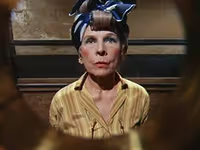Serious Discussion-Stress and Psych Disorders
DG
Broadway Legend Joined: 11/2/05
#100re: The Serious Discussion Thread
Posted: 1/20/06 at 3:36pm
A few things to add, but I'm just going to address the topics, not to an individual.
The Gamble House has recently finished a complete 4-year renovation, so it is in prime condition for viewing. In addition to the house, the surrounding neighborhood has a well-preserved collection of other Greene & Greene houses, as well as some Queen Annes, Tudor and even a Lloyd Wright (which is currently being restored.) A self-guided walking tour map of the neighborhood is available at the Gamble House. Also in Pasadena is a neighborhood designated "Bungalow Heaven" (a registered historical district) that is full of renovated California Bungalows. They have open house tours once a year there.
There are other Lloyd Wright structures in SoCal (and North, as well) that are available for tour. The Hollyhock House is probably the most well known - from his period working with formed concrete blocks (similar to the Biltmore in Phoenix, if you're familiar with that.) Also in Arizona is his Taliesen West, which is where he moved his school in the winters.
Lloyd Wright was definitely the next natural step out of the Arts & Crafts movement. He absolutely agreed with and refined the concept of building within the framework of the existing landscape. Many of his structures are built with materials native to the area - many times from the property itself. Taliesen West, for instance, uses a self-created concrete mixture using the existing sand that was then poured over boulders from the property that had been set in forms. The end result being walls that seem to grow right out of the ground.
Also, life in his school wasn't all about architecture. He truly believed in the wholeness of existence, and incorporated art, music and and other 'living arts' (such as cooking) into his school's life. Every other Saturday night was set aside for formal dining that was prepared and served by the students to each other, and then they adjourned to a connected theatre (built as part of the complex) where they would entertain each other with theatrical, music or art presentations. To be invited to one of those events was quite the coup.
He felt so strongly in the need for designers to connect with nature, that he required all his first year students to live in structures they built themselves in the desert. That tradition continues even today.
As to the internet relationship thing, I think the next logical step is integrating video and audio. That will go a long way toward removing the anonymity which, to my mind, is the source of all the difficulties so far.
One personal note - SOMMS, your little tidbit about your thesis made me weak in the knees. We HAVE to find time to discuss that issue specifically. Not only the aesthetic shift, but how it reflected the era's philosophies, as well. I SWEAR, SOMMS!
Sorry I rambled on like this - just trying to address the different topics.
Updated On: 1/20/06 at 03:36 PM
#101re: The Serious Discussion Thread
Posted: 1/20/06 at 3:38pmNever apologize for intellectual "rambles" DG!
brdlwyr
Broadway Legend Joined: 1/14/05
#102re: The Serious Discussion Thread
Posted: 1/20/06 at 3:40pmI agree C - thanks DG for your thoughts!
Stagedoor2
Leading Actor Joined: 8/1/04
#103re: The Serious Discussion Thread
Posted: 1/20/06 at 4:13pmMost of us can only hope to come across so eloquently in our "rambles".
DG
Broadway Legend Joined: 11/2/05
#104re: The Serious Discussion Thread
Posted: 1/20/06 at 4:16pm
Now I'm thinking about what SOMMS mentioned, the move from the Victorian Era into the Arts & Crafts Movement. In many ways, the Victorians were the personification of the 'presented' life - very focussed on the 'how' of things - how it should be done, how it's going to look, that sort of thing. The focus of the Craftsman Era was much more about the 'why' of living, the actual experience of it all.
Thoreau (a personal hero, and a shining light in the literary and philosophical arena of the Movement) went to Walden for a reason. He rebelled against the disconnect that he felt between himself and the act of living, and he went into nature to find the 'why' again - or maybe even for the first time.
That is the essence of the Movement - to be engaged, connected and personally invested in the living of life. It reflected in the archetecture, which went from houses cut up into small areas designed for specific purposes (THIS is how you eat, and this is WHERE you do it) to homes that were designed for people to LIVE in, with comfort, ease and openness. Front doors began to open directly into living spaces, and they had windows in them so you felt invited by the warm fire you could see inside. You didn't get shuffled off to a 'sitting room', you joined the residents in their living space and joined in the experience of their lives.
Lloyd Wright definitely resonated with this, and championed the development of open and grand living spaces, where many people doing different things could share in the experience with each other. That is reflected in the current use of 'great rooms' today, and I think it absolutely reflects the desire to share in each other's home-based existence.
#105re: The Serious Discussion Thread
Posted: 1/20/06 at 11:56pm
I guess we covered that subject to the best of our abilities and interest, great stuff though, I can honestly say I learned a lot.
We need some thoughts on a topic for discussion tomorrow.
DG
Broadway Legend Joined: 11/2/05
#107re: The Serious Discussion Thread
Posted: 1/23/06 at 1:10am
The thing I noticed is, when you just identify a subject, it is left to those who have an awareness to basically just share information - and you have to depend on development of the discussion to lead to interchange of ideas. I'm thinking that what would be more valuable - as long as people are willing to participate without descending into vitriol - is a 'serious question of the day'.
Basically, it's the same idea - but it allows for input from a variety of perspectives right off the bat. And that's what leads to discussion that could potentially introduce someone to a way of approaching a subject that they hadn't thought of before.
In that vein, if there is interest - and just because it was in the news recently - I would propose, "Do you believe in allowing assisted suicide?"
#108re: The Serious Discussion Thread
Posted: 1/23/06 at 7:56am
Dg,
I like your idea but I was hoping to keep the discussions ALWAYS civil...and that means stemming away from political/religious discussions, unless it's blended into the topic at hand (such as political writers and such).
That said, I LOVE the idea of talking about this, but it's definitely a hot-button, political/religious topic and I think we should, perhaps, do it elsewhere. ![]()
#109re: The Serious Discussion Thread
Posted: 1/23/06 at 8:10am
Even if the person you'd be assisting would be Jose? ![]()
Broadway Legend Joined: 12/31/69
#110re: The Serious Discussion Thread
Posted: 1/23/06 at 9:07am
I trust that somewhere in this thread there has been reference made to William Morris and Bourne-Jones. I'll catch up with a read-through later.
Hi Somms. ![]()
#111re: The Serious Discussion Thread
Posted: 1/23/06 at 9:13am
Assisted-suicide is a terrific topic...fraught with hazards...but a terrific topic, none-the-less. I think that there has to be a commitment made by anyone who participates in this thread to keep it on an intellectual level. It would be a shame to shy away from important topics like this, even though I know I could live to eat my words by sundown.
DG
Broadway Legend Joined: 11/2/05
#112re: The Serious Discussion Thread
Posted: 1/23/06 at 9:20am
Jose' - William Morris made it (Addy even got his political stance discussed,) but I'm afraid Edward went unmentioned.
And Iflit, I agree. I understand the reticence, but in thinking about it, I'm hard pressed to think of things that couldn't take a wrong turn somewhere.
#113re: The Serious Discussion Thread
Posted: 1/23/06 at 9:22am
Oh DG, you kill me!
(you mean like that?) ![]()
#114re: The Serious Discussion Thread
Posted: 1/23/06 at 9:26am
ok. If people like Iflit and DG are interested in pursuing this topic, I do believe we can keep it civil, especially if we focus on the arguments for and against and, perhaps, not necessarily our own personal convictions.
Or at least our personal convictions without vitriol for opposing viewpoints.
DG
Broadway Legend Joined: 11/2/05
#115re: The Serious Discussion Thread
Posted: 1/23/06 at 9:33am
One can but try, bway ![]()
As for me, I think it's rather inhumane to deny someone access to help that could make their choice easier and free of suffering. But then, of course, you have to accept suicide itself as a personal right.
DG
Broadway Legend Joined: 11/2/05
#116re: The Serious Discussion Thread
Posted: 1/23/06 at 9:37am
bway - I think euthanasia and assisted suicide are two different things. euthanasia originates from the care-provider, while assisted suicide deals with the will of the dependent person (that's an over-simplification, and crude terminology, but hopefully you get my point.) I think either one is worthy of discussion, but together might be a little overwhelming.
Then again, maybe not.
touchmeinthemorning
Broadway Legend Joined: 9/3/04
#117re: The Serious Discussion Thread
Posted: 1/23/06 at 9:41am
I think this is the only issue that is a hot button that I really have no firm conclusion on. I worked for a few years at a hospice, and saw many people suffer who wished to die. I also saw how their life was more than THEIR life, it was a communal life -- no man (or woman) is an island. But, if we look at life in biographical (not biological) terms, it is clear when life is over. And does it really serve the community to have a prolonged ending to the biography? In some cases, I would say no, and in others I would say yes. And I guess it really shouldn't be the sole choice of one person, but rather a communal decision of those who are close to the person. How that decision-making process works itself out is beyond me, though.
Any ideas?
#118re: The Serious Discussion Thread
Posted: 1/23/06 at 9:49am
"And I guess it really shouldn't be the sole choice of one person, but rather a communal decision of those who are close to the person."
oh I don't think so....when those people pay my bills, then they have a right to say when I die, and ONLY then. We come into this world alone and we leave alone, and no group has the right to have any say about when we leave. It is MY decision, and MY decision alone....and if there is a "group" involved, and they love me, they will respect that decision.
#119re: The Serious Discussion Thread
Posted: 1/23/06 at 9:51am
Title edited, DG. ![]() Thanks for the differentiation.
Thanks for the differentiation.
This topic is so hot-button. Touchme, thanks for your thoughts. I'd agree with you on some points...and god knows I'm pulling "The big one" out right from the beginning, but I'm not so sure a decision like this should always be communal.
Take the Schiavo case. Her family was on the record saying they wanted her alive for themselves. Now, regardless of your stance on the issue either way, I think anyone can admit that's a selfish stance to take, placing the needs/pain/suffering of your daughter beneath your own desire not to let her go.
#120re: The Serious Discussion Thread
Posted: 1/23/06 at 9:57am
I think iflit is referring to the fact that the last time we discussed this topic, papalovesmambo behaved in an especially repugnant manner and posted something--inaccurately--about my deceased mother for which I have requested a public and sincere apology.
I think any decent human being would admit that other posters' dead mothers are off-limits for verbal abuse.
#121re: The Serious Discussion Thread
Posted: 1/23/06 at 9:58amand, in the Schiavo case.....her wishes were made known. This is why it is extremely important to legally make your wishes known should you be incapacitated.
#122re: The Serious Discussion Thread
Posted: 1/23/06 at 10:01am
The problem there, Elphaba, is that there are still ways around that.
Had Schiavo a living will giving her husband the right to remove her life-saving measures, her parents could have still fought the way they fought. There's a chance it would have dragged on longer, but they could still do it.
touchmeinthemorning
Broadway Legend Joined: 9/3/04
#123re: The Serious Discussion Thread
Posted: 1/23/06 at 10:04am
"when those people pay my bills, then they have a right to say when I die, and ONLY then."
Wow. Under that premise, those who are taken care of by a governmental system can be killed at whim. i'm sure you wouldn't advocate that, so, perhaps a different premise for who gets to decide should be approached.
As far as Schiavo goes, I would hope there would be some mechanism set up that allows the grieving families wishes to be honored, but not always followed. How that is done, I don't know...but I think investigating ways is the essential part of the conclusion of this issue.
#124re: The Serious Discussion Thread
Posted: 1/23/06 at 10:11am
touchme, You know exactly what point I was making, let's not get caught up on semantics.
Only I get to decide if and when I want assisted-suicide. No one else.This is a matter of personal rights and freedom, nothing more. Society has NO right to decide that for me.
Now, obviously, as touchme I am sure will grab onto this...if I am mentally incompetent, then even I don't have that right, UNLESS when I was competent, I made these wishes known.
My parents, wife, partner, children have NO right to keep me alive, or NOT let me die if it is MY wish to do so.
It is really that simple.
The government has their dirty hands everywhere else, keep them and society OUT of that.
Videos





